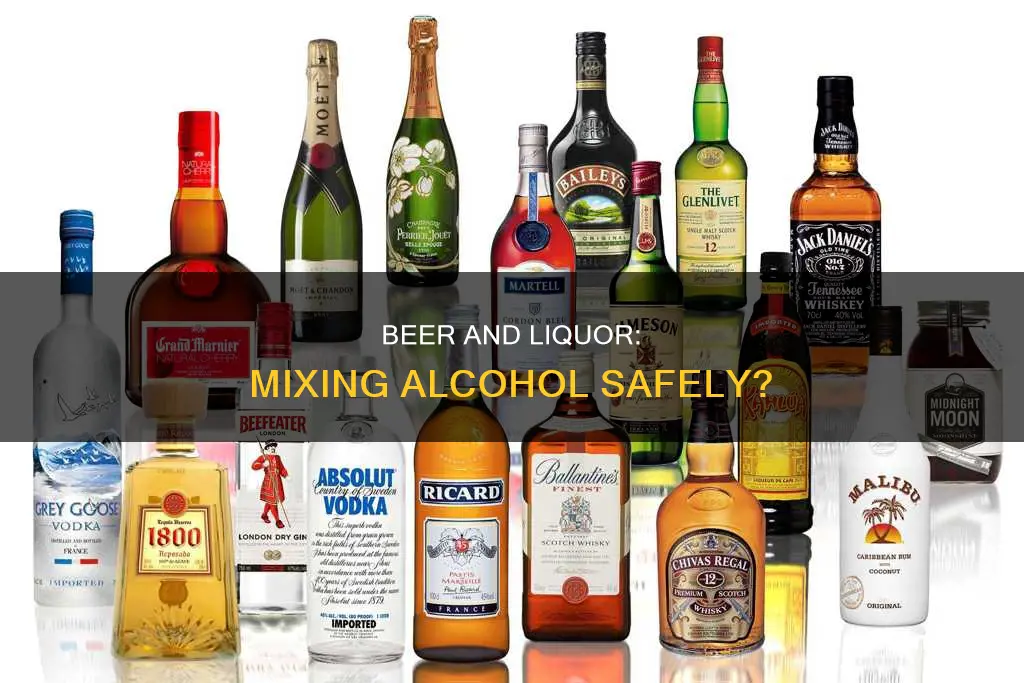
Beer before liquor, never been sicker; liquor before beer, you're in the clear is a well-known phrase with many variations, but is there any truth to it? The saying suggests that drinking beer after liquor can worsen hangover symptoms. However, modern research has debunked this myth, showing that the order of consumption does not affect the severity of a hangover. Instead, the amount of alcohol consumed is a more significant factor in determining the likelihood and intensity of a hangover. While the drinking order may not influence hangovers, other factors such as genetics, food intake, and smoking can also play a role in how you feel after a night of drinking.
| Characteristics | Values |
|---|---|
| Common sayings | "Beer before liquor, never been sicker; liquor before beer, you're in the clear." "Beer before wine and you'll feel fine; wine before beer and you'll feel queer." "Grain or grape, but never the twain." |
| Scientific evidence | There is little scientific evidence to support the idea that drinking order influences hangovers or intoxication levels. |
| Factors that affect hangovers | Amount of alcohol consumed, genetics, whether food was consumed, frequency of drinking, smoking, congeners, sleep, and drinking on an empty stomach. |
What You'll Learn
- Hangover severity depends on the amount of alcohol consumed, not the type
- Carbonated drinks irritate the stomach lining, increasing alcohol absorption
- Alcohol is absorbed into the bloodstream as soon as it reaches the stomach
- Liquor before beer may slow subsequent spikes in blood alcohol levels
- Drinking on an empty stomach can worsen alcohol side effects

Hangover severity depends on the amount of alcohol consumed, not the type
The saying goes, "Beer before liquor, never been sicker; liquor before beer, you're in the clear." This is a popular phrase with unknown origins, but it's largely considered a myth. The order in which you drink alcohol is unlikely to influence whether you experience a hangover the next day. Alcohol begins to be absorbed into your bloodstream as soon as it reaches your stomach, so all the alcohol you drank the night before will have been absorbed long before your hangover sets in.
The severity of a hangover depends on the amount of alcohol consumed, not the type. The more alcohol you drink, the more likely and the worse your hangover will be. This is true regardless of whether you drink beer, wine, spirits, or a combination of these.
However, it's important to note that the type of alcohol can affect how quickly you get drunk and how severe your hangover is. For example, liquor has a higher alcohol content and is more likely to spike your blood alcohol levels in a short period. On the other hand, beer takes longer to hit the system and is usually drunk slower. Therefore, if you start with beer and then move on to liquor, you may find yourself getting drunk faster and experiencing a worse hangover.
Other factors that can affect your risk of a hangover include:
- Whether you ate before drinking: Drinking on an empty stomach causes alcohol to move quickly from your stomach to your intestines, where it can be absorbed more rapidly and spike your blood alcohol levels.
- How frequently you drink: Heavy drinkers are more likely to reach blood alcohol concentration levels that lead to hangovers.
- Genetics: Your genes can influence how your body metabolizes alcohol and can impact sleep, hydration, blood sugar levels, and blood vessel dilation—all factors that can influence hangover severity.
- Congeners: These are compounds found naturally in alcoholic beverages, and certain types of alcohol contain higher levels of congeners. Congeners may worsen hangover symptoms.
- Smoking: Hangovers may be more frequent in people who smoke compared to non-smokers.
Exploring Beer Drinking Laws in Maine's Great Outdoors
You may want to see also

Carbonated drinks irritate the stomach lining, increasing alcohol absorption
Carbonated drinks can irritate the stomach lining, increasing alcohol absorption. This is primarily due to the carbonation in these beverages, which can cause digestive issues such as stomach pain, bloating, and gas. The carbonation increases gastric volume, leading to feelings of fullness and nausea. Additionally, the carbon dioxide in these drinks can act as an irritant, causing gastric mechanical distress.
The irritation caused by carbonated drinks can be attributed to both mechanical and chemical effects. The mechanical effect is the physical introduction of air into the stomach, similar to what happens when eating or drinking too fast. The chemical effect is related to the carbon dioxide itself, which can irritate the stomach lining. This irritation can lead to increased alcohol absorption, as the stomach lining is compromised and alcohol can enter the bloodstream more quickly.
Furthermore, carbonated drinks can create a feeling of having consumed more alcohol than one actually has. This is due to the gastric filling effect, where the stomach is filled with air from the carbonation. As a result, individuals may feel more intoxicated than they actually are, potentially leading to poor decision-making or impaired judgment.
It is important to note that not everyone experiences the same level of sensitivity to carbonated drinks. Some people may feel bloated and distended, while others may not notice any adverse effects. However, for those who are sensitive to carbonation, it is advisable to avoid these beverages to prevent discomfort.
In conclusion, carbonated drinks can irritate the stomach lining due to the presence of carbonation and its mechanical and chemical effects. This irritation can increase alcohol absorption, leading to higher blood alcohol content. Therefore, it is essential to be mindful of the potential impact of consuming carbonated drinks, especially when mixed with alcohol.
Beer and Getting Ripped: Friends or Foes?
You may want to see also

Alcohol is absorbed into the bloodstream as soon as it reaches the stomach
The idea that drinking beer after liquor will make you "never been sicker" is a myth. The order in which you consume your drinks is unlikely to influence whether you experience a hangover the next day. This is because alcohol is absorbed into the bloodstream as soon as it reaches the stomach. Thus, all the alcohol you drank the night before will have been absorbed before your hangover takes effect.
Alcohol is a drug that acts as a depressant in the body. It is a small, water-soluble molecule that is relatively slowly absorbed from the stomach and more rapidly absorbed from the small intestine. It is then freely distributed throughout the body.
Once swallowed, a drink enters the stomach and small intestine, where small blood vessels carry it to the bloodstream. Approximately 20% of alcohol is absorbed through the stomach, and most of the remaining 80% is absorbed through the small intestine. The liver is the primary organ responsible for the detoxification of alcohol.
The rate of absorption of alcohol depends on several factors. It is quickest when alcohol is drunk on an empty stomach, and the concentration of alcohol is 20-30%. Food, especially carbohydrates, can slow down the absorption of alcohol.
The only way to completely prevent a hangover is to not drink alcohol or to drink in moderation. However, staying hydrated, drinking in moderation, and getting plenty of sleep may also help prevent a hangover.
Beer and Paxlovid: Is It Safe to Drink?
You may want to see also

Liquor before beer may slow subsequent spikes in blood alcohol levels
The popular saying, "beer before liquor, never been sicker; liquor before beer, you're in the clear", suggests that drinking liquor after beer can intensify hangover symptoms. However, this is a myth, as the order of consumption does not influence a person's hangover.
The theory behind the saying is that liquor has a higher alcohol content and is more likely to spike your blood alcohol levels in a short period of time compared to beer. Therefore, ending the night with liquor after drinking beer can quickly increase a person's already elevated blood alcohol content, contributing to a hangover.
On the other hand, starting with liquor and ending with beer may slow subsequent spikes in blood alcohol levels, potentially reducing the severity of hangover symptoms the next day. This is because the carbonation in beer increases the surface area of the alcohol, allowing it to be absorbed more quickly and readily by the stomach. So, if you drink beer and then liquor, the liquor will be absorbed faster than if you started with liquor and then moved to beer.
However, despite these theories, the order of consumption is unlikely to affect whether you experience a hangover. This is because alcohol is absorbed into the bloodstream as soon as it reaches the stomach, and all the alcohol consumed will have been absorbed before a hangover takes effect. As long as the total amount of alcohol consumed remains the same, drinking liquor before beer will not protect against a hangover any more than drinking beer before liquor.
The amount of alcohol consumed has a much more significant effect on the likelihood and severity of a hangover than the type of alcohol or the order of consumption. To reduce the risk and severity of a hangover, it is important to drink in moderation, regardless of the type of alcohol.
Beer on Board: Drinking Beer on Small Flights
You may want to see also

Drinking on an empty stomach can worsen alcohol side effects
When you drink on an empty stomach, much of the alcohol passes quickly from the stomach into the small intestine, where most of it is absorbed into the bloodstream. This intensifies all the side effects of drinking, such as your ability to think and coordinate your body movements.
Drinking a large amount of alcohol (2-3 drinks in a short amount of time) on an empty stomach is dangerous. Doing so affects the way your body processes alcohol. While having an alcoholic drink or two may not affect you, binge drinking on an empty stomach will significantly and rapidly raise your blood alcohol level. This can be dangerous and potentially cause unpleasant and toxic side effects.
Binge drinking with little food in your system can lead to faster intoxication. It can also lead to gastritis and other stomach problems (often related to excess stomach acid). You may also suffer from these immediate health effects and behavioural changes:
- Loss of coordination
- Reduced responsiveness
- Uncontrolled eye movements
- Inability to speak coherently
- Tachycardia (rapid heartbeat)
- Risky sexual behaviours
Consuming a very large amount of alcohol in a short amount of time, especially on an empty stomach, can be dangerous and sometimes even fatal.
Beer and Nyquil: A Safe Mix?
You may want to see also
Frequently asked questions
The amount of alcohol consumed has a more significant effect on a hangover than the type of alcohol. However, according to some, drinking beer after liquor can cause more extreme hangover symptoms.
Some experts suggest that carbonated beverages like beer irritate the stomach lining, causing alcohol to be absorbed more quickly. Others suggest that drinking liquor first overwhelms the body's liver enzymes, and drinking beer after means the liver doesn't have enough time to generate detoxification enzymes, leading to more severe hangover symptoms.
No, there is little scientific evidence to suggest that drinking types of alcohol in a specific order can decrease the chances of getting a hangover or make it more bearable.
The only way to completely prevent a hangover is to not drink alcohol or to drink in moderation. Staying hydrated, drinking in moderation, getting enough sleep, and eating high-protein, high-fat foods while drinking can also help prevent a hangover.







